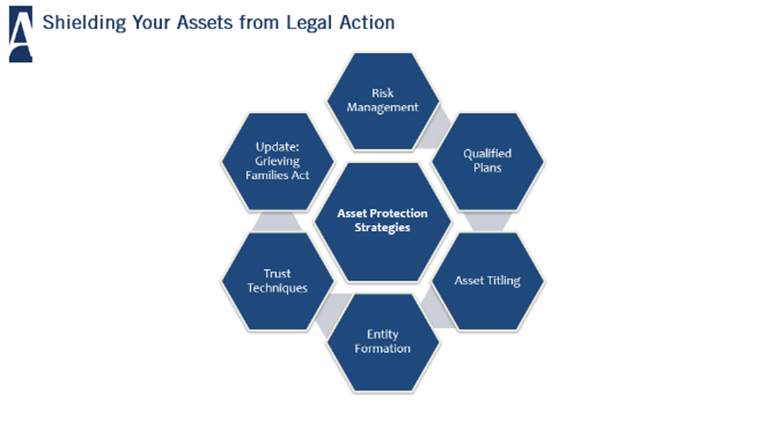 Are Your Assets Protected from Legal Action?
Are Your Assets Protected from Legal Action?
Are you familiar with strategies that can shield your financial assets from potentially costly legal actions? These steps can range from risk management such as proper insurance and estate planning to taking advantage of federal and state retirement-asset exemptions to securing appropriate titling of your assets or forming legal entities such as trusts to gain creditor protection.
I’d like to share some tips on this topic that could ultimately add to your financial peace of mind.
As director of financial planning at Altfest Personal Wealth Management, I’ve been fortunate to advise many high-net-worth clients on ways they can shield their assets from potentially costly legal action. Although we’re not lawyers, our firm takes a holistic approach by coordinating with attorneys and insurance professionals to design creditor protection strategies for our clients.

To start off, let’s talk about smart insurance planning. Risk management of this type is your first line of defense in the event a lawsuit is filed against you. It includes having various types of insurance, such as malpractice and excess liability, or what we call “umbrella insurance,” for shielding personal assets.
How much insurance is enough?
Malpractice insurance, especially for health-care professionals, is the foundational protection for your personal assets. But in the current environment in which juries and the public are more sympathetic toward victims and likely to give out higher rewards, it’s really important to have a thoughtful malpractice insurance plan in place. The question is though, how much is enough? If necessary for your profession, this is likely to be one of the most expensive insurances you’re going to invest in, so it’s natural to wonder how much you should be getting. Unfortunately, the answer is: It depends.
A good starting point, in our opinion, is to seek coverage with enough benefits to pay for very basic legal costs like defense settlement and final judgment. You could think about other things, such as what level of coverage your peers are carrying in your geographic area. Or, if in the medical field, how prone your specialty is to lawsuits.
Also, not having enough personal liability insurance is one of the biggest oversights people make in terms of creditor protection. Specifically, we urge our physician clients to set up an “umbrella” insurance policy for coverage in the event of a non-malpractice-related lawsuit. As doctors are often perceived to be deep-pocketed targets, an umbrella, or excess liability, policy can protect your assets in such situations – it picks up coverage where your auto or home insurance policies leave off.
At first glance, you might not think of the IRS as a creditor, but they are one if you owe estate taxes or income taxes. Yes, your estate actually files one last income tax return for you after you pass away and if you owe taxes, your estate (and by extension your family) is liable to pay the balance. With this in mind, we recommend that our clients work with an insurance advisor to determine how best to ease the financial consequences for loved ones if you died. We regularly help our clients connect with such auxiliary service providers with the goal of shielding their assets appropriately.
Qualified retirement plans also offer protection
Another recommendation I make when focusing on creditor protection for clients is to make sure that they participate in a qualified employer retirement plan like a 401(k), a 403(b) or a 457 because these plans receive very beneficial asset protection, both from some states and the federal government. U.S. laws exist to protect retirement savings from creditors, so we can help our clients to maximize their contributions to the right kinds of retirement plans to shelter that money from creditor seizure.
Learn about life insurance options
One last tactic that can be helpful for a limited number of clients is using life insurance, possibly a permanent policy with cash value built into it, to shield assets from potential legal actions. Depending on the state you’re in, this policy’s cash value may receive some protection from creditors. This strategy is most helpful after all other accessible accounts are maxed out (in other words, employer qualified retirement plans) and there’s nowhere else to place capital without severely restricting access, such as in an irrevocable trust, which I explain below.
These life insurance policies should be highly customized and tailored to you as an individual, not bought off the shelf. Remember that insurance doesn’t prevent you from being getting sued, but it certainly provides resources to manage those lawsuits, if they occur.
It’s worth mentioning that even though we are fee-only fiduciaries and never accept commissions or kickbacks, due to the potential for commissioned insurance agents to present less-than-ideal policies to clients, we work closely with highly vetted and trusted insurance consultants to ensure smooth execution of this part of the financial plan.
Consider asset titling, entity formation or a trust
Last, think about looking into next level of protection – forming a legal entity like a limited liability company (LLC) to protect more assets. Or perhaps using an action like asset titling. Unfamiliar with this technique? It’s a legal step that’s among the simpler options for asset protection. I often tell clients to consider one called tenancy by entirety. It’s a way for married couples to hold equal interest in real estate or other real property, as well as survivorship rights to keep their property out of probate. But it’s not the same as 50/50 ownership.
With this type of titling, each spouse owns 100% of the property. As such, it protects your home or your other real estate from either spouse’s creditors. A creditor cannot force the split-up of such a titling, so cannot reach the money. It’s worth looking into if it’s available in your state.
Your business or medical practice may already be structured as a corporation or limited liability company (LLC). Did you know you can do something similar with your personal assets to gain protection from judgments, whether external lawsuits, such as a malpractice action, or a personal lawsuit? For instance, if you own rental property, you might form an LLC for it to shield those assets from a tenant lawsuit. A family limited partnership (FLP) may be another suitable option, in some cases.
Last, we frequently introduce our clients to attorneys who can set up asset protection trusts for them. These are types of irrevocable trusts that allow you to transfer assets, thereby giving up control and ownership of the assets, but retaining the ability to receive distributions from the trust. This is probably your ultimate asset protection tool. It’s important to note that if you are an income beneficiary of a trust, the distributions are made at the discretion of the trustees and are not mandatory. So, to the extent that you don’t have to take the distributions out of the trust, that money is not accessible to creditors. But be aware it’s one of the more expensive and labor-intense techniques for shielding your assets.
Find out more
These ideas are just an introduction to the many avenues that clients can take to ensure their considerable assets are protected from potential legal action. As I always tell those I advise, good asset protection involves layers of strategy.
Learn more about how our advisors might be able to help you assess your creditor protection. If you have specific questions or concerns about your current level of asset safety, please book some time for a complimentary consultation.
Investment advisory services provided by Altfest Personal Wealth Management (“APWM”). All written content on this site is for information purposes only. Opinions expressed herein are solely those of APWM, unless otherwise specifically cited. Material presented is believed to be from reliable sources and no representations are made by our firm as to another parties’ informational accuracy or completeness. All information or ideas provided should be discussed in detail with an advisor, accountant or legal counsel prior to implementation. All investing involves risk, including the potential for loss of principal. There is no guarantee that any investment plan or strategy will be successful.

Ekta Patel, CFP, MBA
Ekta helps clients with all aspects of their investment and personal financial planning matters. She works collaboratively with financial advisors to ensure Altfest’s personal touch is incorporated throughout each aspect of our service. Ekta is passionate about working with women at the firm to promote self-confidence and career growth.
Ekta is a CFP® licensee and a member of the National Association of Personal Financial Advisors (NAPFA), and was twice named to Financial Advisor magazine’s Due Diligence/Research Manager All-Star Team. She holds a BS in Mathematics from the State University of New York at Stony Brook and an MBA in Investment Management and Information Systems from Pace University.

